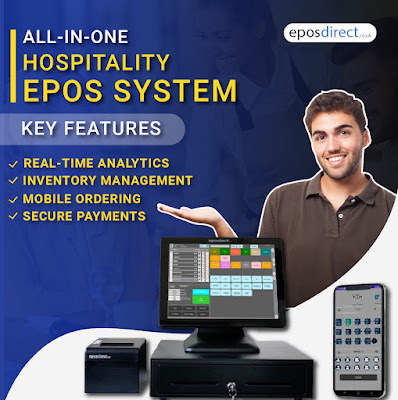In the dynamic landscape of modern business, technology has
become an indispensable tool for growth and success. One such technological
marvel that has significantly impacted the way businesses operate is the
Electronic Point of Sale (EPOS) system. Till systems for retail have evolved from traditional cash registers into
sophisticated, data-driven solutions that not only streamline transactions but
also provide valuable insights for decision-making. Harnessing the potential of
EPOS systems can be a game-changer for businesses, leading to increased
profitability through enhanced efficiency, improved customer experience, and
informed strategic choices.
Streamlined Transactions and Efficient Operations
At its core, an EPOS system is designed to facilitate smooth and
efficient transactions. By automating the process of sales recording, inventory
management, and payment processing, businesses can reduce the time and effort
required for routine operations. This efficiency translates into increased
productivity, as employees can focus on more value-added tasks instead of
manual data entry.
Moreover, digital till systems offer real-time tracking of inventory levels, enabling businesses to optimize their stock management. This minimizes the occurrence of stockouts or overstocking, leading to reduced wastage and carrying costs. Accurate inventory data also helps in better demand forecasting, ensuring that popular products are readily available and less popular ones are ordered judiciously, preventing tying up resources in slow-moving items.
Enhanced Customer Experience
A seamless and satisfying customer experience is paramount for any business aiming to thrive in today's competitive market. EPOS systems play a crucial role in achieving this by expediting the checkout process and minimizing waiting times. Quick and hassle-free transactions improve customer satisfaction, leading to repeat business and positive word-of-mouth referrals.
Furthermore, the advanced POS till system UK can integrate with customer relationship management (CRM) software, allowing businesses to personalize interactions based on previous purchases and preferences. This personalization not only enhances the customer's experience but also opens up opportunities for upselling and cross-selling, increasing the average transaction value.
Data-Driven Insights for Informed Decisions
One of the most significant advantages of modern EPOS systems lies in their ability to capture and analyze vast amounts of transactional data. This data, when harnessed effectively, provides valuable insights that can guide strategic decisions. Businesses can identify trends, understand buying patterns, and recognize the effectiveness of various marketing initiatives.
For instance, a restaurant using an EPOS system might analyze data to discover which menu items are most popular during specific times of the day or which promotions lead to the highest sales. Armed with such insights, the restaurant can tailor its offerings and marketing strategies to maximize revenue during peak hours and boost sales during slower periods.
Inventory Optimization and Cost Control
Effective inventory management is a delicate balancing act that directly impacts a business's profitability. Till systems empower businesses to maintain optimal inventory levels by offering real-time data on product sales and stock levels. With accurate inventory information, businesses can reduce carrying costs associated with excess stock and prevent lost sales due to stockouts.
Furthermore, EPOS systems can track supplier performance and pricing trends, enabling businesses to negotiate better deals and optimize procurement. This not only leads to cost savings but also ensures a steady supply of goods without disruptions.
Data Security and Fraud Prevention
Financial losses due to fraudulent activities can significantly impact a business's profitability. Modern EPOS systems are equipped with robust security measures to protect sensitive customer information and prevent unauthorized access. Secure payment processing and encryption protocols ensure that financial transactions are conducted safely, fostering customer trust and loyalty.
Moreover, the Point of Sale system can employ data analytics to detect unusual patterns that might indicate fraudulent activities, such as unusual transaction amounts or repeated voids. Timely detection and prevention of such incidents can safeguard the business's reputation and financial well-being.
Conclusion
In a fast-paced business environment where efficiency, customer satisfaction, and informed decision-making are paramount, EPOS systems for grocery stores emerge as powerful tools for increasing profitability. These systems not only streamline transactions and operations but also provide a wealth of data-driven insights that can shape strategic choices. By enhancing the customer experience, optimizing inventory management, controlling costs, and preventing fraud, businesses can harness the full potential of EPOS systems to drive growth and prosperity. As technology continues to evolve, embracing EPOS solutions is no longer just an option but a necessity for businesses seeking to thrive in the modern marketplace.


No comments:
Post a Comment